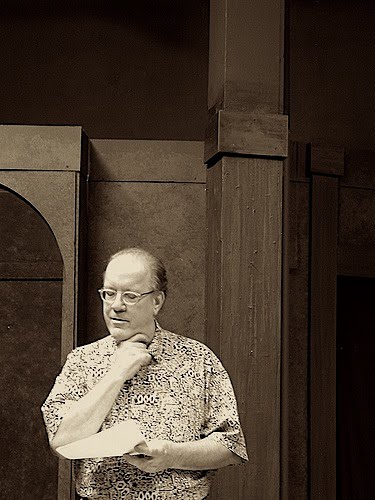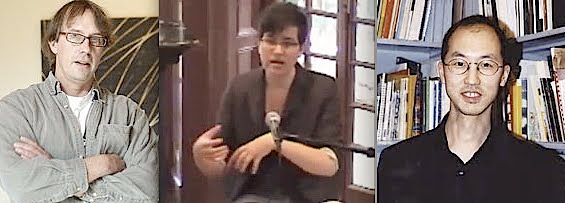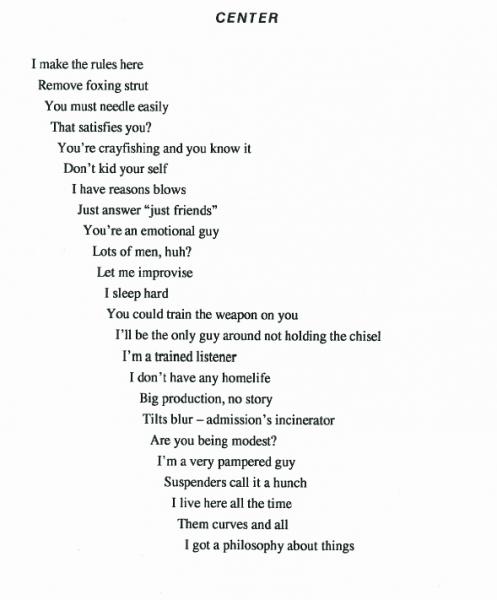
Trained listener (PoemTalk #35)
Bruce Andrews, 'Center'
 The range of Bruce Andrews’s work is fairly well represented by the recordings available on his PennSound page. The earliest recorded reading we have dates from late 1977, the most recent (as of this writing) is from 2008. Generally it is true that PoemTalk’s format – the choice of a single short poem for which a recording exists – will tend to misrepresent the whole of the poet’s work. Fortunately it’s not the aim of PoemTalk to represent the whole, but to have a good and earnest listen and look at the single instance along the way, Having done this 35 times in this series, we find, mostly to our surprise, that tenable general statements of a poet’s mode and aesthetic disposition do come through the back door of low conceptual expectations. Surely that’s what happened here, when Tan Lin, Chris Funkhouser, Sarah Dowling and Al Filreis took on a single poem from Andrews’ sequence called Moebius. Moebius was written in the late 1970s but not published until 1993, when a chapbook appeared from the Generator Press in Ohio. On November 10, 1977 Andrews came to the Ear Inn in New York, performed at a reading alongside Ray DiPalma and Michael Lally, and gave us fine readings of many of the Moebius poems, including “Center,” which is the piece we discuss in PT35.
The range of Bruce Andrews’s work is fairly well represented by the recordings available on his PennSound page. The earliest recorded reading we have dates from late 1977, the most recent (as of this writing) is from 2008. Generally it is true that PoemTalk’s format – the choice of a single short poem for which a recording exists – will tend to misrepresent the whole of the poet’s work. Fortunately it’s not the aim of PoemTalk to represent the whole, but to have a good and earnest listen and look at the single instance along the way, Having done this 35 times in this series, we find, mostly to our surprise, that tenable general statements of a poet’s mode and aesthetic disposition do come through the back door of low conceptual expectations. Surely that’s what happened here, when Tan Lin, Chris Funkhouser, Sarah Dowling and Al Filreis took on a single poem from Andrews’ sequence called Moebius. Moebius was written in the late 1970s but not published until 1993, when a chapbook appeared from the Generator Press in Ohio. On November 10, 1977 Andrews came to the Ear Inn in New York, performed at a reading alongside Ray DiPalma and Michael Lally, and gave us fine readings of many of the Moebius poems, including “Center,” which is the piece we discuss in PT35.
First we found something we took to be unusual in Andrews: the emphasis on distancing goes along with a tone of softness and wistfulness (as Sarah suggests), perhaps even vulnerability notwithstanding the aggressive idiom (“I make the rules here”). But soon we sensed we were seeing the Bruce Andrews we would know from later works. Naturally one asks if the speaker of these masculine phrases--all this deliberate 70s guy talk--is an individual, a single subject. No, Tan Lin suggests, the poem’s phrases comprise not those of an individual speaker but identify the language production we associate with a particular kind of speaker. So the poem is a meta-statement on how language is generated and that, in turn, constructs a kind of identity, although that identity is never really offered. As Chris points out, the poem feels like an aggressive encroachment on the white space of the page. The poem, spiraling down the page, forces one to think of a moebius shape which claims centrality (has a center but yet doesn’t quite). Such a claim, because of the moebius, will seem repeatedly arbitrary, and so does the normative standard for the discernment, by socio-linguistic cues, of a fixable speaking identity, and so that (the emptiness of that effort) is your center. (Which is to say: what center? why are you looking here for one?)
 “Center” might be an internalized monologue; such self-formed speaking permits the non-sequitur. At the same time, though, the poem’s eschewing of beginning, middle and end reminds Chris of the permutation work that the digital poets have been doing in recent years. “It reminds me of certain works I’ve seen on my screen rather than on a page.” Chris wants to think of this poem as pre-digital. It certainly helped us to conceive of it this way for the purposes of discussion.
“Center” might be an internalized monologue; such self-formed speaking permits the non-sequitur. At the same time, though, the poem’s eschewing of beginning, middle and end reminds Chris of the permutation work that the digital poets have been doing in recent years. “It reminds me of certain works I’ve seen on my screen rather than on a page.” Chris wants to think of this poem as pre-digital. It certainly helped us to conceive of it this way for the purposes of discussion.
Here is the Ear Inn recording of our poem, from 1977. And here [PDF] are a few pages from the Generator Press edition of Moebius.
